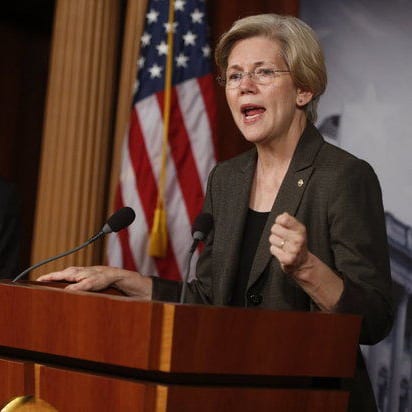Politicians Scramble to Fix Broken Student Loan System as Write-Offs Soar
Americans are taking out more loans than ever to pay for college and defaulting on them in record numbers.
Politicians, most notably U.S. senators Dick Durbin, D-Ill., Jack Reed, D-R.I. and Elizabeth Warren, D-Mass., have introduced legislation to address the growing problems with student loans, but their efforts have stalled short of reaching the Senate floor for a vote.
The Consumer Financial Protection Bureau estimates that 7 million borrowers are in default, and that another 9 million have loan payments deferred or in forbearance, meaning they aren’t making payments because they are in financial distress, unemployed, in the military or have re-enrolled in school.
Those in deferral or forbearance are carrying about $212 billion of the estimated $1 trillion federal student loan debt. Private lenders are owed another $200 billion — bringing the total for student loan debt to $1.2 trillion.
Write-Offs Last Year: $4.27 Billion
Equifax, one of the three major U.S. credit reporting agencies, claims that lenders wrote off $13.6 billion in student loan debt from January to August of 2013. That is $4.27 billion more in write offs compared to the same period in 2012.
Like many other negative financial matters, the Great Recession is blamed for the bulging bubble of debt.
College enrollment surged 37 percent from 2000 to 2013, reaching a high of 21.8 million in 2011. Many of the students were older workers, who were laid off when the U.S. economy soured from 2007 to 2009. Most were hoping a diploma would help them find a new job or at least upgrade their skills at a time when few businesses were hiring.
As the economy improved, many of the older students returned to work, but took enormous debt back to the job site. Two-thirds of 2013 graduates left school owing money and the average loan debt was $29,400. Much of it attributed to soaring tuition and fees. The average cost for in-state tuition is up 86 percent from 2000 to 2012 ($4,650 to $8,600) and 36 percent ($21,310 to $29,060) for private schools.
Bills Lingering in Senate Committees
Economists say the burden of student loans, combined with fewer job opportunities and lower salaries, are two reasons the economic recovery is slow. They find that recent college graduates are reluctant to take on financial responsibilities, like mortgages, car loans or starting a business, because they already have too much debt.
Durbin, Reed and Warren recently introduced the Protect Student Borrowers Act of 2013 that would make colleges take on some of the risk when student default on loans. Colleges could face fines from 5 to 20 percent of the amount students owe. The fines could be reduced if the college offers one-on-one counseling to help students manage their loan debt.
“Ensuring hard-working graduates can retire their student debt in a reasonable fashion will unlock a great deal of economic potential and consumer demand,” Reed said in a conference call last month with reporters. “That will have a positive ripple effect throughout our economy.”
Warren added: “Our higher education system is broken, and we need to make fixing it a real priority. We can start by restoring consumer protections to student loans, which are crushing our families.”
Other bills that have been introduced include Student Loan Borrower Bill of Rights Act and Fairness for Struggling Students Act of 2013. None has made it to the Senate floor yet for a vote.
Sources:
- Sandman, J. (2014, January 3) Student Loan Write-Offs Surge. Mainstreet.com. Retrieved from http://www.mainstreet.com/article/moneyinvesting/education-planning/student-loan-write-offs-surge
- Chopra, R. (2013, August 5) A closer look at the trillion. Consumerfinance.gove. Retrieved from http://www.consumerfinance.gov/blog/a-closer-look-at-the-trillion/
- NA, ND. Fast Facts. Nces.ed.gov. Retrieved from http://nces.ed.gov/fastfacts/display.asp?id=98
- Lederman, D. (2013, May 17) Enrollment Decline Picks Up Speed. Insidehighered.com. Retrieved from http://www.insidehighered.com/news/2013/05/17/data-show-increasing-pace-college-enrollment-declines


















